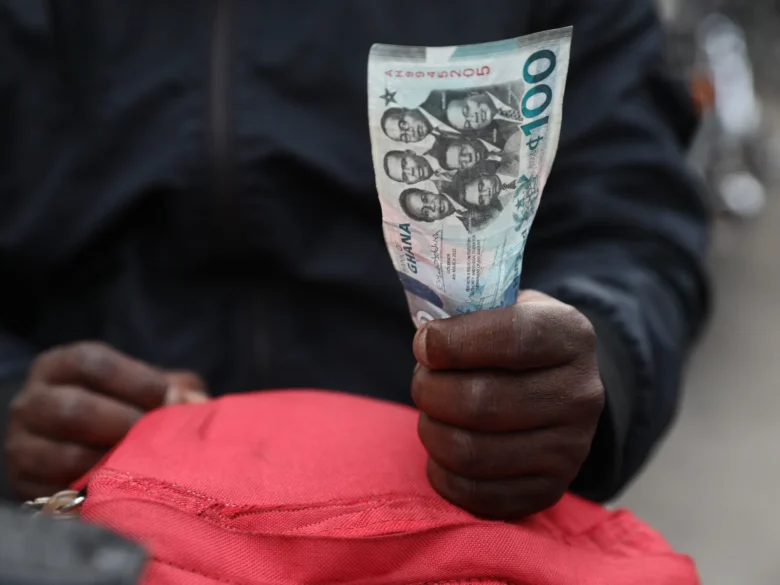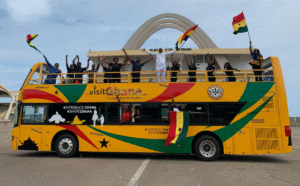Traveling to Ghana is an enriching experience, whether you’re drawn to its historic slave forts, coastal towns, cultural festivals, or entrepreneurial opportunities. But one of the most crucial elements of a successful trip—or long-term stay—is managing your finances effectively.
This guide explains Ghana’s currency, budgeting tips, and how to use mobile money, which is an essential part of everyday transactions in the country.
💱 Ghanaian Currency Basics
The official currency of Ghana is the Ghanaian Cedi (GHS).
- Symbol: GH₵
- Coins: 1 pesewa, 5, 10, 20, 50 pesewas; 1 and 2 cedi coins
- Banknotes: 1, 2, 5, 10, 20, 50, 100, and 200 cedi notes
💡 Note: The value of the cedi can fluctuate. As of mid-2025, $1 USD equals around 12–14 GHS, but rates vary. Always check before exchanging.
💸 Where to Exchange Money
1. Airports and Forex Bureaus
- The Kotoka International Airport in Accra has currency exchange counters, but rates tend to be less favorable.
- Use licensed forex bureaus in town centers for better rates. Always count your money carefully before leaving the counter.
2. Banks
- Major banks like GCB Bank, Ecobank, Stanbic, and UBA also exchange currency.
- You’ll need a valid ID (passport) for currency exchange at banks.
3. Avoid Black Market Exchanges
Although some locals may offer better rates informally, black-market currency exchange is illegal and risky. You could be given counterfeit bills or short-changed.
🏧 Using ATMs in Ghana
- ATMs are widely available in cities but less reliable in rural areas.
- Visa cards are more widely accepted than Mastercard.
- Some reliable ATM brands: Stanbic Bank, Ecobank, Zenith Bank.
- Be aware of daily withdrawal limits and fees from your home bank.
💡 Tip: Inform your bank before traveling to avoid having your card blocked due to “suspicious activity.”
📊 Sample Daily Budget in Ghana (Mid-Range Traveler)
| Expense Category | Cost Range (GHS) | USD Equivalent (Approx.) |
|---|---|---|
| Budget Hotel Room | 100–300 GHS/night | $8–$25 |
| Local Meals (3/day) | 90–150 GHS | $7–$12 |
| Transportation (Bolt) | 30–60 GHS/day | $2.50–$5 |
| Internet/SIM/Data | 10–30 GHS | <$2 |
| Museum or Entry Fees | 20–60 GHS | $1.50–$5 |
A moderate budget traveler can live on $25–$40 per day. Luxury travel and shopping will push that higher, while budget backpackers could manage on $15–$20 with hostel stays and local street food.
🧾 Tipping in Ghana
Tipping is appreciated but not obligatory in most settings.
- Restaurants: 5–10% for good service
- Taxis and Bolt: Round up the fare or add a small tip
- Hotel staff: 5–10 GHS for bellhops or cleaners
- Tour guides: 10–50 GHS depending on tour length
📱 Understanding Mobile Money in Ghana
Mobile money (often called MoMo) is one of the most widely used financial tools in Ghana. It allows you to send, receive, and store money using just your phone—no bank account needed.
1. Major Mobile Money Providers
- MTN Mobile Money (MoMo) – Most popular and widely accepted
- Vodafone Cash
- AirtelTigo Money
2. How It Works
- Register with a valid ID at a mobile operator office
- Load money via mobile money agents (they’re everywhere!)
- Dial a USSD code (like *170# on MTN) to access your wallet
- Pay bills, buy airtime, send money, or shop online
3. Why You Should Use It
- Cashless: Safer than carrying large sums of cash
- Fast: Transfers are instant, even across networks
- Convenient: Use it to pay for taxis, groceries, market purchases, bills, and more
💡 Insider Tip: Many locals prefer mobile money to bank transfers—it’s faster and doesn’t require internet access.
💳 Credit & Debit Card Use
Cards are accepted at:
- Major hotels
- Upscale restaurants
- Malls and supermarkets (like Shoprite, MaxMart, Palace)
But most street vendors, small restaurants, and taxis still operate on cash or mobile money only.
Always have some cash on hand—especially if traveling outside Accra or Kumasi.
🔒 Avoiding Financial Pitfalls
Here are common mistakes travelers make and how to avoid them:
❌ Overreliance on Cards
- Many places don’t accept foreign cards.
- Some POS machines are unreliable or temporarily offline.
✅ Solution: Always carry some cash and have mobile money set up as a backup.
❌ Using ATMs at Night
- Late-night ATM visits can pose a safety risk, especially in isolated areas.
✅ Solution: Withdraw money during daylight hours, preferably at a bank branch.
❌ Ignoring Fees
- Some ATMs charge local + international fees per withdrawal.
✅ Solution: Withdraw larger amounts less frequently, or use low-fee ATMs like those at Ecobank or Zenith Bank.
❌ Falling for Fake MoMo Agents
- Scammers sometimes pose as MoMo agents and charge inflated fees or steal your balance.
✅ Solution: Only deal with registered agents in kiosks with proper branding and ID.
🧠 Budgeting Tips for Long-Term Travelers or Expats
- Negotiate rent: Many landlords expect it, especially if paying in bulk.
- Buy local: Imported goods are expensive—buy Ghanaian where possible.
- Use public transport: Tro-tros and shared taxis are extremely affordable.
- Track expenses: Use budgeting apps like Trail Wallet, Monefy, or Spendee.
💼 Business and Investment Tips
Planning to do business in Ghana?
- You’ll need to open a local bank account—this requires a non-citizen ID and business registration documents.
- Consider working with accountants or legal professionals who understand Ghana Revenue Authority regulations.
- For cross-border transfers, services like Wise (formerly TransferWise) and WorldRemit offer better rates than traditional banks.
✅ In Summary
| Topic | Key Takeaway |
|---|---|
| Currency | Ghanaian Cedi (GHS); always exchange at trusted locations |
| Mobile Money | Widely used, especially MTN MoMo; safe and convenient |
| Budgeting | $25–$40/day for moderate comfort; less for backpackers |
| Card Use | Accepted in formal settings; cash and MoMo needed elsewhere |
| ATMs | Use trusted banks; avoid night withdrawals |
| Safety | Avoid unlicensed agents and count money at forex bureaus |
🌍 Final Thoughts
Ghana is a fantastic country to explore, but financial preparedness will make or break your experience. Understand how the local money system works, carry multiple payment options, and budget according to your lifestyle.
With this guide, you’re now ready to navigate Ghana’s money matters like a pro—so go ahead and focus on enjoying the culture, the people, and the incredible adventures waiting for you.




